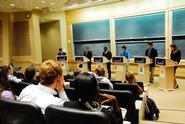
Students of Professor Sharon Rivera's Comparative Politics (Government 112) classes and members of the Hamilton community participated in a mock debate and election exercise involving six political parties campaigning for the parliamentary elections of West Europa on April 21.
Each party in the fictitious European country was comprised of a party leader, a party secretary, one to two policy experts, and one to two press secretaries, all of whom were delegated various tasks to develop, illustrate, and present their party's ideas.
The six parties included the West Europan Social Traditionalists (led by Charlie Kaplan '11), the West Europa People's Party (led by Brian O'Malley '10), the West Europan Libertarian Party (led by Woody Faugas '12), the Free Liberal Independent Party (led by Will Weisblatt '11), the Aurinthian Liberation Front (led by Eli Remillard '12), and the National People's Party (led by Natalie De Boursac '11).
After watching the parties' campaign videos, party leaders engaged in a debate covering West Europa's current and future economic, social, and foreign policies. Party leaders made opening and closing statements, asked questions of other party members, and addressed questions asked by the general audience. At the end of the debate, both the audience and a panel of judges determined the West Europan Libertarian Party to have performed best overall.
Second place went to the Aurinthian Liberation Front. However, election results reported by Professor Rivera revealed a close race between the West Europan Social Traditionalists and the West Europan People's Party for the highest number of parliamentary seats won, with the other parties trailing behind.
Despite coming in second overall, the West Europa People's Party's successful majority coalition building with the Free Liberal Independent Party and the Aurinthian Liberation Front illustrated the potential for multi-party cooperation in a parliamentary system of governance.
The development of the simulation was made possible by funding from a Class of 1966 Career Development Award, the Dean of Faculty's Office, and the Government Department. Rivera's simulation, titled "Elections in West Europa," is forthcoming in a web-based format with Congressional Quarterly Press.
-- by Cristina Garafola '11
Each party in the fictitious European country was comprised of a party leader, a party secretary, one to two policy experts, and one to two press secretaries, all of whom were delegated various tasks to develop, illustrate, and present their party's ideas.
The six parties included the West Europan Social Traditionalists (led by Charlie Kaplan '11), the West Europa People's Party (led by Brian O'Malley '10), the West Europan Libertarian Party (led by Woody Faugas '12), the Free Liberal Independent Party (led by Will Weisblatt '11), the Aurinthian Liberation Front (led by Eli Remillard '12), and the National People's Party (led by Natalie De Boursac '11).
After watching the parties' campaign videos, party leaders engaged in a debate covering West Europa's current and future economic, social, and foreign policies. Party leaders made opening and closing statements, asked questions of other party members, and addressed questions asked by the general audience. At the end of the debate, both the audience and a panel of judges determined the West Europan Libertarian Party to have performed best overall.
Second place went to the Aurinthian Liberation Front. However, election results reported by Professor Rivera revealed a close race between the West Europan Social Traditionalists and the West Europan People's Party for the highest number of parliamentary seats won, with the other parties trailing behind.
Despite coming in second overall, the West Europa People's Party's successful majority coalition building with the Free Liberal Independent Party and the Aurinthian Liberation Front illustrated the potential for multi-party cooperation in a parliamentary system of governance.
The development of the simulation was made possible by funding from a Class of 1966 Career Development Award, the Dean of Faculty's Office, and the Government Department. Rivera's simulation, titled "Elections in West Europa," is forthcoming in a web-based format with Congressional Quarterly Press.
-- by Cristina Garafola '11
Posted April 23, 2009
